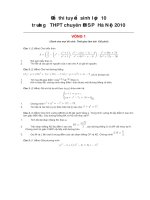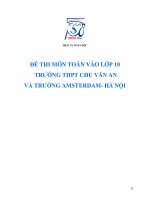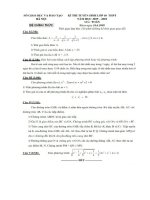2. Đề thi tuyển sinh vào lớp 10 TP. Hà Nội năm học 2017-2018 (đại trà) 2
Bạn đang xem bản rút gọn của tài liệu. Xem và tải ngay bản đầy đủ của tài liệu tại đây (97.51 KB, 5 trang )
<span class='text_page_counter'>(1)</span><div class='page_container' data-page=1>
<b>TEST 02 </b>
<b>I. Choose the word whose underlined part differs from the others in pronunciation. </b>
1. A. scream B. break C. dream D. leave
2. A. chemical B. cheerful C. channel D. challenge
3. A. laughed B. placed C. hoped D. closed
<b>II. Choose the word that differs from the other ones in stress pattern. </b>
4. A. service B. prepare C. exact D. device
5. A. difficult B. possible C. excellent D. surprising
<b>III. Choose the underlined part that needs correction. </b>
6. (A) When Andrew (B) saw the question, he (C) was knowing the answer (D) immediately.
7. I (A) can’t buy (B) that book because I haven’t got (C) some money (D) left.
8. (A) Your brother hardly (B) goes to work (C) by bus, (D) doesn’t he?
9. In order to (A) being a good sales clerk, you (B) mustn’t be rude (C) to the (D) customers.
10. If we (A) will reduce the speed of (B) population growth, there will be (C) less pressure (D)
on the earth.
<b>IV. Choose the best option to complete the sentence. </b>
11. He is tired………he stayed up late watching TV.
A. and B. or C. if D. because
12. Things have changed a lot...I wrote to you last time.
A. when B. since C. as D. before
13. Mary jogs everyday...lose weight.
A. so she can B. so that she can C. because she can D. so that to
14. ……… her lack of hard work, she was promoted.
A. In spite B. Even though C. In spite of D. Despite of
15. He tried to prevent the cat………….……running into the road.
A. to B. from C. against D. for
</div>
<span class='text_page_counter'>(2)</span><div class='page_container' data-page=2>
A. then B. and C. when D. while
17. You……… play loud music at night. The neighbours will call the police.
A. mustn’t B. needn’t C. might not D. couldn’t
18. Doing ……… driving is a way to save energy.
A. more B. fewer C. not D. less
19. Two tons of rice………. to the victims of the flood yesterday.
A. sent B. were sent C. was sent D. has been sent
20. When we………. him tomorrow, we will remind him of that.
A. will see B. see C. am seeing D. saw
21. My father asked us ………too much time playing computer games.
A. not to spending B. did not spend C. not to spend D. to not spent
22. She………her father; everyone says “How alike they are!”
A. carries out B. puts up C. looks for D. takes after
23. It’s important ………wildlife before it is too late.
A. conservation B. conserving C. to conserve D. conserve
24. Thank you very much ………inviting me to your birthday party.
A. about B. with C. because D. for
25. Hurry up! We………in 15 minutes.
A. were leaving B. are leaving C. left D. have left
26. I'm very busy at the moment so it may take ………time to answer your letters.
A. a little B. a few C. any D. many
27. You'd better ……… out late at night. It's dangerous.
A. not go B. not to go C. don't go D. not going
28. John: “Congratulations! You did great.”
Mary: “………”
A. It’s nice of you to say so.
B. It’s my pleasure.
C. You’re welcome.
D. That’s okay.
29. I ………the guitar when he came home.
A. practise B. practised C. was practising D. have practised
30. Lan said that her family ……… for a picnic the following Sunday.
</div>
<span class='text_page_counter'>(3)</span><div class='page_container' data-page=3>
31. A: “Would you mind turning the fan on?’’
B: “………”
A. Yes, please.
B. No, thank you.
C. Not at all.
D. No, I’m not.
32. That famous book………of five chapters.
A. consists B. comprises C. makes D. has
33. The music is too noisy. Please turn it ………
A. on B. down C. off D. up
34. I went out in the rain and now I have a bad cold. I wish I………out.
A. didn't go B. wouldn't go C. hadn’t gone D. went
35. The man………your sister is talking to is my math teacher.
A. whose B. that C. when D. who
<b>V. Choose the word that has the closest meaning to the underlined one. </b>
<b>36. James Watt was well-known for his invention of the steam engine. </b>
A. successful B. rich C. famous D. honest
<b>37. Some large cities have taken different measures to reduce air pollution. </b>
A. fight B. minimize C. cover D. grow
38. Professor Berg was very interested in the diversity of cultures all over the world.
A. variety B. changes C. conservation D. number
39. When being interviewed, you should concentrate on what the interviewer is saying or asking
you.
A. be related to
B. be interested in
C. pay all attention to
D. express interest to
<b>40. I will communicate with you as soon as I have any news. </b>
A. become related
B. be interested in
C. get in touch
<b>D. have connection </b>
<b>VI. Read the passage then choose the correct option that best fits each gap. (Question 41-45) </b>
Everyone wants to reduce pollution. But the pollution problem is as complicated
</div>
<span class='text_page_counter'>(4)</span><div class='page_container' data-page=4>
benefit people. For example, exhaust (42) ... automobiles causes a large percentage of
all air pollution although they provide transportation for millions of people. Factories
(43)... much of the material which pollutes air and water, but factories give employment
to a large number of people.
Thus, to end or reduce pollution immediately, people have to stop using many things that
benefit them. Most of the people do not want to do that, of course. But pollution can be (44)
... reduced in several ways. Scientists and engineers can work to find ways to lessen
the amount of pollution that such things as automobiles and factories cause. Governments can
pass and enforce laws that require businesses and individuals to stop, or cut (45) ... on
certain polluting activities.
41. A. since B. because C. as D. for
42. A. in B. from C. at D. for
43. A. offer B. emit C. discharge D. dissolve
44. A. increasingly B. dangerously C. hopelessly D. gradually
45. A. down B. off C. up D. into
<b>VII. Read the passage and choose the best option A, B, C or D to answer the question. </b>
<b>(Question 46-50) </b>
Every year people in many countries learn English. Some of them are young children.
Others are teenagers. Many are adults. Some learn at school. Others study by themselves.
A few learn English just by hearing the language in films, on television, in the office or
among their friends. Most people must work hard to learn English.
Why do all these people learn English? It’s not difficult to answer this question. Many
<b>boys and girls learn English at school because it is one of their subjects. Many adults </b>
learn English because it is useful for their work. Teenagers often learn English for their
higher studies because some of their books are in English at the college or university.
Other people learn English because they want to read newspapers or magazines in
English.
46. According to the writer, English is learnt by...
A. young children B. people of different ages
</div>
<span class='text_page_counter'>(5)</span><div class='page_container' data-page=5>
<b>47. The word “it” refers to ... </b>
A. country B. young children C. English D. question
48. Where do many boys and girls learn English?
A. at school B. at home C. in evening classes D. in the office
49. Why do adults learn English?
A. Because they want to see movies in
English
B. Because it’s not difficult to learn.
C. Because they are forced to learn it
D. Because they need it for their job.
50. Which of the following statements is NOT mentioned in the passage?
A. Children like reading English newspapers.
B. People in many countries learn English.
C. English is one subject in school.
D. Some books are written in English.
<b>Đáp án: </b>
1. B 11. D 21. C 31. C 41. C
2. A 12. B 22. D 32. A 42. B
3. D 13. B 23. C 33. B 43. C
4. A 14. C 24. D 34. C 44. D
5. D 15. B 25. B 35. D 45. A
6. C 16. D 26. A 36. C 46. C
7. C 17. A 27. A 37. B 47. C
8. D 18. D 28. A 38. A 48. A
9. A 19. C 29. C 39. C 49. D
</div>
<!--links-->









